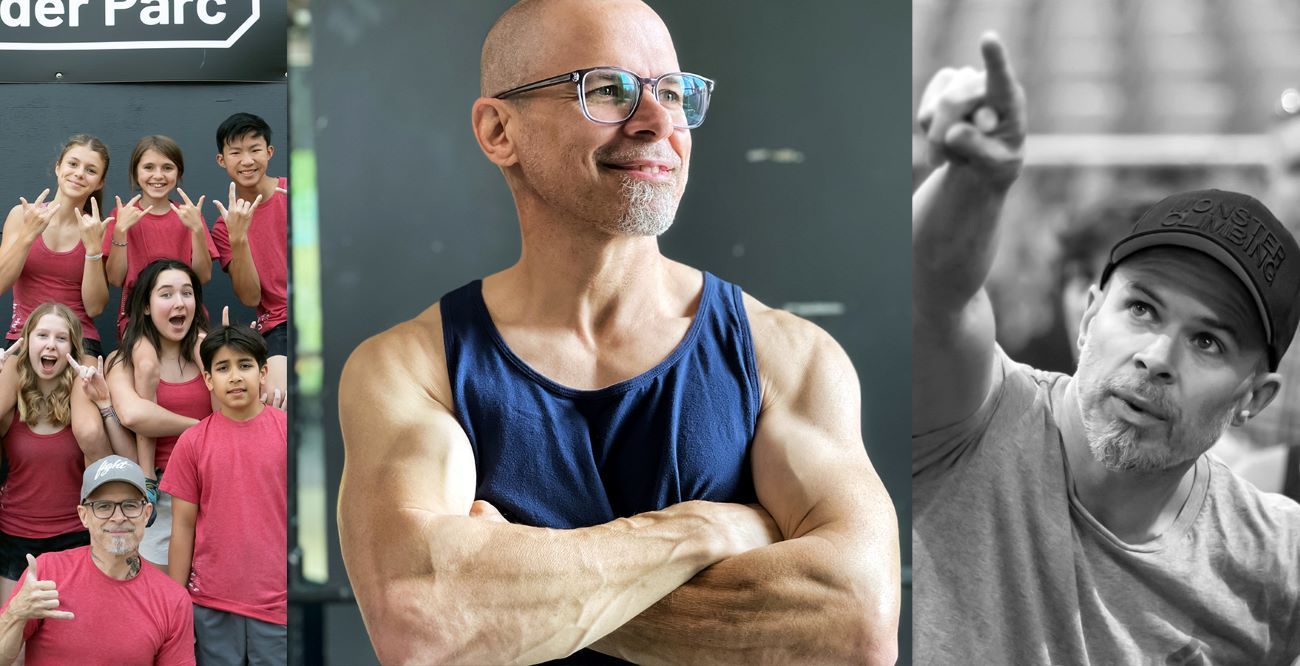Interview with Climbing Coach Matt Chapman: Part 1
I chatted with Canada's most popular rock climbing coach, Matt Champan, to talk about his philosophies about competition, how he draws from other sports, and John Danaher's parable of the plank.

I recently had the opportunity to chat with Canada's most popular rock climbing coach, Matt Chapman, to talk about his philosophies about competition, how he draws from other sports, and John Danaher's parable of the plank.
I've known Matt since I started competing. Based out of Toronto, Matt is a coach in the Ontario Climbing Federation and is quickly becoming one of the biggest names in rock climbing coaching around the world.
He coaches the competitive youth team at Boulder Parc in addition to numerous other competitive and professional athletes around the world, whom he coaches remotely. Included in this list is his daughter, Indiana Chapman, a fellow teammate of mine on the Open Canadian National Team who is a National and North American Cup Champion herself.
Together, his athletes have racked up nearly 20 National titles in various countries, and many compete in the International Federation of Sport Climbing (IFSC).
Matt has travelled far and wide for training camps and competitions, and this very month will head down to the States on official coaching business.
I caught him for a phone call the other night and had a great conversation, covering many topics in great detail - so great that I'll have to split this interview into two parts!
[Chapman]: Yeah, I mean, I like doing this. And I love to talk shop. I kind of nerd out on this stuff, so I'm studying and writing constantly. I always love an opportunity to share.
[Richardson]: Mhmm. Well, yeah, it definitely came across in your other vlogs and blogs that you've been helping out with because your answers were so in-depth, they almost went beyond the questions that you're asked.
[Chapman]: Oh, yeah, that might happen today. Once I get going, you just tell me when to stop. (laughs)
[Richardson]: Mhmm. Yeah, I'm excited to see what you're going to say to these! This first question, I have a feeling you're gonna have an interesting answer.
What's your favourite movie and why?
[Chapman]: (laughs) The Revenant with Leonardo DiCaprio is currently my favourite movie. For numerous reasons: It's a major film, major set, beautiful cinematography. The acting was exceptional. It's rooted in history. I thought the whole movie was just right up my alley.
And then I'd say close second and third are Jordan Peele's movies. Jordan Peele is that amazing comedian who does Key and Peele on YouTube. He's also a brilliant director. He did Get Out, and then he did Us.
[Richardson]: Yeah I've definitely seen those other two in your top three there. Cool! All right so the first climbing/coaching/professional question I've got for you is:
What would you say is your unique take on coaching? What sets you apart from other coaches that you've worked with or know about?
[Chapman]: Mmm, that's an interesting question. (pauses) Okay, so for me, being a coach is about being a performance climbing coach, which is to coach athletes for competition.
I did think of this actually the other day. I was driving home, which is where I often get my ideas.
I had this thought that competition for me is simultaneously nothing and everything.
So I'll give you an example. I try to reduce the significance of competition for my athletes. The idea actually comes from a guy named John Danaher, somebody I read and watch on YouTube all the time. He's a renowned jujitsu coach and he talks about the parable of the plank.
It's a really brilliant story about how athletes tend to get swept up in the production of competition, in the "big-ness" of the event, and so you feel stressed and you feel pressure.
So I took this parable that talks about in relationship to jiu-jitsu, and I made adjustments to better suit it to climbing. And this is how I tell it.
Imagine a plank of wood. It's a two-by-four, four inches wide, eight feet long. And we lay that board on the floor. You as an athlete walk across it, and I make you do that every day for hours. You walk across the plank, you can do cartwheels on it, maybe like some 180º jumps. Maybe you just landed your first 360º jump. You can walk on it backwards, maybe even blindfolded. You're pretty comfortable and confident at doing tricks on this plank of wood.
But then it's competition time. They take that plank of wood and they place it 12 feet in the air and they have scorecards and they add a timer and there's a crowd. Suddenly, doing that cartwheel on the four inch plank suspended 12 feet in the air feels really different, right? You feel fear. You feel pressure. You feel doubt.
What I ask my athletes is why?
Why do you suddenly feel pressure? When it's the same thing that you do in practice all the time and you know you can do a 360º jump on it blindfolded, but now suddenly you feel pressure. You feel doubt. Why? What's going on?
And what I tell my athletes is: the only thing that's actually changed is your perception of consequence. Is the consequence really there, or is it just how we perceive the consequence?
So I'll give you an example: When you fall in practice, it's no big deal, but when you fall in competition, it affects your future opportunities. You know, maybe you're not going to make it to the next round or the next stage of competition or you're not going to get enough points for the Canadian National Ranking for the national team.
So your perception of consequence has changed. And it can feel quite real and quite severe, but nothing else actually has changed. It's the same plank that you walk across easily. You have all the skills to perform your best, but you don't because you have made the consequences of falling mean more. They don't mean anything, but we make them mean more.
And so the goal for the athlete is to pretend that the plank is on the floor like normal, and to create that fiction with such confidence, that you can completely and convincingly de-escalate the drama of competition and just do what you know you can do, consequence-free.
This is the art of competition - to make competition nothing, like it's just another day of doing what you do best.
So that's from the athlete's perspective. It can be really helpful to make competitions mean nothing. That's what I mean by competition for me is nothing, but it's also everything.
So from the coaching perspective, competition is everything. It's what we train for. Like, why are we doing this? Why am I committing a whole career and kids committing their childhood to going to the gym and grinding out these training sessions? Well, we do it for competition.
This is the point.
And an athlete's confidence comes from feeling and knowing that you're prepared. And you know that as an athlete, if you feel super prepared for a comp, you go in with confidence. It's as easy as that. And so, preparation is of course part responsibility of the athlete, but it's also part responsibility of the coach.
And I personally, to answer your first question, take that responsibility very seriously. To me, it's everything. That's the other side.
So competition is nothing; competition is everything.
It's my job. It's my livelihood. It's my career. But more importantly than that, it's how I can serve my athletes. As somebody who wants to serve and care for others, this is how I do that. I can care and serve for my athletes by making sure that they are as prepared as possible to do what they love, what they've chosen to do.
And you know, I'd say I don't really care about winning compared to process and preparation. The preparing and the process of preparing athletes for competition is what I enjoy most about this job. Competition is just game day - an opportunity to test ourselves and all the preparatory work that we do.
And that's my approach to helping athletes deal with competition, but also how seriously I take my job as a coach.
[Richardson]: Yeah, that's really interesting.
So how often do you do that plank drill? Is that at the beginning of the season?
[Chapman]: No, it's just a talk. Conor McGregor, a UFC fighter, was recently quoted as saying it's 100% mental. And I agree with him. Competition sports are 100% mental.
So, you know, as much as we train quite hard physically, and I make sure my athletes are physiologically prepared, a lot of work goes into the mental. So that's sometimes sitting down and talking with the group about concepts that are important to being ready for comps, but also sometimes just pulling a few kids aside that are struggling and talk it through.
And I have many psychologies that we talk about, but the parable of the plank is one of them.
[Richardson]: Yeah, and it's definitely a good one. Yeah, I definitely haven't even really seen competition through that exact lens. Like, that's a very concise and clear way of putting it.
[Chapman]: Well, you know, a lot of my ideas are... I mean, Picasso said, "All art is theft," and I agree - a lot of my ideas are borrowed from and adapted from best practices from other sports.
Climbing is a relatively new sport. There's not many coaches out there that are really innovating.
So I tend to go to sports like boxing, swimming, running, and just older sports that have decades of data, research and trial and error. I read about these and then figure out how to borrow best practices and apply them to my approach to coaching. I've been in the climbing game for 28 years now, but it feels very new in its growth, and I really enjoy the process of keeping my finger on the pulse of its evolution.
So John Danahar, as my favorite jiu-jitsu coach, is who I borrowed the plank example from and it is brilliant and helpful.
[Richardson]: Yeah, yeah, and I completely agree with all that. Climbing really doesn't have an established mental training protocol or even physical training protocol.
I ended up borrowing actually a lot from CrossFit, which happens to be an even newer sport, but because it's just so popular, its growth has been so rapid that they've already got a really solid base of mental training.
[Chapman]: Yeah, absolutely. I'm a huge fan. Tia-Clair Toomey and Mat Fraser are two of my favourite athletes.
[Richardson]: Yeah, of course. Awesome.
Tune in next week for part 2 of our interview with rock climbing coach Matt Chapman as we discuss his views on winning and losing, his influential Instagram following, and how we can get more of Matt Chapman's thoughts and ideas out into the world.
•
A Madison Richardson Article
Originally published on RichardsonsClimbing.com
